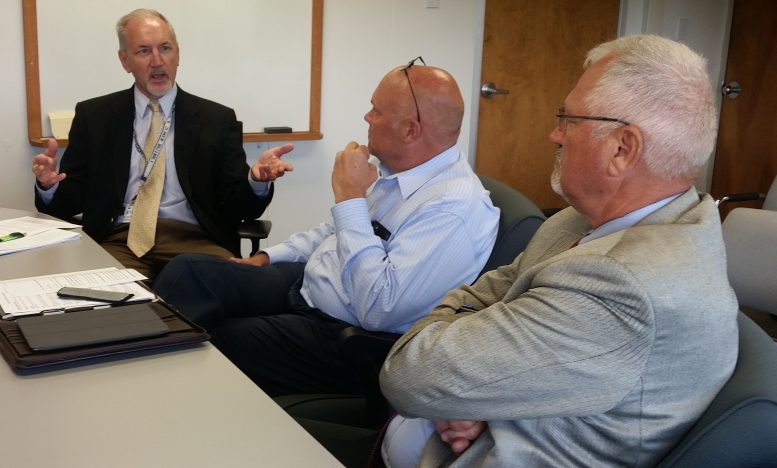By JAN LARSON McLAUGHLIN
BG Independent News
As Lake Erie starts to take on a green tint again this summer, entities north of Bowling Green are scouting for quality, affordable water – with no clear source in sight. So the search continues, now shifting west to an underground water source, and north to Detroit.
Proposals change by the week, according to representatives of the Northwestern Water and Sewer District, who recently updated the Wood County Commissioners on the issue affecting much of the northern half of the county.
The district provides water to 6,500 customers in Northwood, Rossford, Walbridge, Lake Township, Perrysburg Township and Troy Township. The water is purchased from the city of Toledo – and future contracts with the city are on shaky ground.
The proposed Toledo Area Water Authority – which many had pinned their hopes on as a solution that would work for the entire region – appears to be dead in the water, according to Jerry Greiner, executive director of the district.
Toledo balked at the idea of sharing ownership of its water plant, even though it meant other entities would then help with the towering expenses to update the plant.
“Whether you’re the city of Toledo or Bloomdale, cities don’t want to give up their utilities,” said Rex Huffman, attorney for the district.
But the district, Huffman said, sees the water customers as the owners – not the city.
With the sinking of the TAWA plan, Toledo is now offering another possible option. Last week, Toledo Mayor Wade Kapszukiewicz talked about establishing a regional water commission with representatives from each community that buys Toledo’s water. The commission would then set water rates for all customers based on the true cost of service and would make decisions about capital improvements.
The district is willing to consider any viable option, Greiner and Huffman said.
“Some easily dismiss it, and say ‘I don’t want to deal with Toledo.’ But I think that’s a mistake,” Huffman said.
The district may support this concept if it meets the long-term goal of reasonable, uniform, fair water rates, Greiner said.
Water customers in Wood County share one priority. “That’s the number in the lower right hand corner of their bill,” Huffman said.
Toledo rates have always been the lowest in the region – but major improvements are needed at the water plant, Greiner said. Bowling Green and Oregon rates are good, but both would need expansions to serve the district.
So the district is continuing to consider all its water options, Greiner said. That includes a groundwater source through Artesian of Pioneer, in the northwest corner of Ohio.
“They happen to be sitting on one of the largest fresh water aquifers in our part of the world,” Huffman said of the aquifer that extends into Michigan. “They tell us it’s an underground Lake Erie – that’s how big it is.”
The district and other area entities in search of water are even looking as far away as Detroit. Unlike Lake Erie, where the algal blooms are showing up again this summer, Lake Huron has no harmful algae.
The city of Detroit is sitting on extra water, since industries are using less water, and there are fewer residents to serve.
The city of Sylvania is leaning pretty seriously toward Detroit water, according to Doug Miller, of the district board. Water from Detroit already goes as far south as Monroe, he said.
“Transporting water a long way is expensive, but not as expensive as we used to think,” Huffman said.
“It’s all about what our customers pay. We’re trying to find the lowest rate,” Huffman said.
Meanwhile, the clock is ticking – with the district’s contract with Toledo expiring in 2024.
“We’re looking at all the sources to get the lowest number,” Miller said.
“The devil is in the details,” Greiner wrote recently in his blog on the water issue. District officials hope to have options outlined by the end of this year. They will then hold a public meeting to discuss their preferred alternative.





